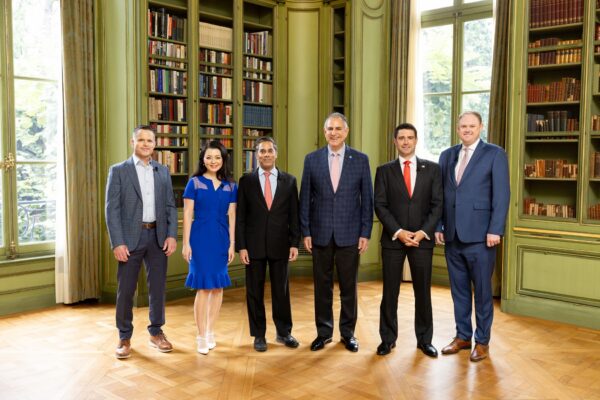Diplocraft: Federal Energy Policy Overview

Global energy demand has surged, driven by emerging economies and the rapid expansion of data centers supporting artificial intelligence. On August 5, 2025, Meridian hosted a federal energy policy overview as part of our Diplocraft series, bringing together leading officials from the U.S. Department of Energy, National Energy Dominance Council, U.S. Department of Commerce, and the U.S. Department of State with energy and economic ministers and Meridian stakeholders to share insights, clarify the roles of federal agencies, and highlight the future of energy innovation in the United States.
The discussion centered on the Trump Administration’s energy strategy, emphasizing regulatory reform, expansion of energy production, and securing critical mineral supply chains to support domestic growth and global competitiveness. The discussion also highlighted the increasing energy demands driven by artificial intelligence and the role of federal agencies in facilitating infrastructure development and international cooperation.
These Were the Top Takeaways from the Program
1. The Trump Administration's Energy Agenda
The Trump Administration is pursuing an “energy dominance agenda” aimed at reindustrializing America and enhancing both domestic prosperity and global stability. Central to this strategy is the expansion of energy production and exports, particularly in oil, natural gas, and nuclear power. The administration also emphasizes deregulation, aiming to remove barriers to innovation and entrepreneurship. By prioritizing domestic energy development, the policy seeks to ensure stable energy prices that are positioned as a buffer against global disruptions and a foundation for sustained economic growth.
2. The Formation of the National Energy Dominance Council (NEDC)
Established by executive order on February 14, the National Energy Dominance Council (NEDC) serves as a central coordinating body for advancing energy projects across the United States. The NEDC aims to streamline the federal permitting process by facilitating interagency collaboration. The council’s priorities include keeping coal plants operational, promoting critical mineral mining, and supporting the development of other energy resources. It also plays a strategic role in addressing the growing energy demands of AI-driven data centers. Through active engagement with the private sector, the NEDC works to identify and eliminate regulatory barriers, accelerating the pace of U.S. energy infrastructure development.
3. LNG Exports and the Future of U.S. Energy
The United States has transformed from the world's largest importer of natural gas into a major exporter, thanks to the rapid expansion of domestic energy production. The federal government is currently advancing new permits for LNG export projects and supporting infrastructure growth, including large-scale initiatives like the Alaska LNG project. LNG production in the U.S. is expected to double over the next five to seven years, positioning the U.S. as a key supplier while demand for reliable energy continues to grow. This expansion presents a significant opportunity for the administration to partner with the private sector to accelerate infrastructure development, unlock new markets for American energy, and enhance U.S. leadership in building a more secure and sustainable global energy future.
4. Expansion of Nuclear Energy and Civil Nuclear Cooperation
The administration is prioritizing the growth of U.S. civil nuclear energy with a goal to quadruple capacity in 25 years and begin construction on 10 large-scale reactors by 2030. The Department of Energy is supporting this through major investments, including the Advanced Reactor Demonstration Program to accelerate small modular reactor (SMR) development. Internationally, a key component of this strategy is the establishment of "123 agreements" —bilateral nuclear cooperation frameworks that facilitate the peaceful use of nuclear technology, create long-term energy partnerships, and enhance both energy security and economic development. These agreements position the U.S. as a global leader in the civil nuclear space while reinforcing strategic alliances
5. Diversifying Critical Mineral Supply Chains
Securing and diversifying critical mineral supply chains is a key priority for both economic resilience and national security. The State Department has reorganized its Bureau of Economic, Energy, and Business Affairs to focus more directly on this issue, aiming to reduce reliance on China, especially in midstream processing. The Department of Energy is the largest investor in U.S. midstream capacity, offering grants and financing to expand domestic processing and separation capabilities. Strengthening these supply chains helps mitigate the risks of economic coercion and supports long-term energy and technology independence.
Project summary
| Diplocraft: Federal Energy Policy Overview | August 2025 | |
|---|---|
| Countries: | United States |
| Impact Areas: | Governance and Transparency |
| Program Areas: | Diplomatic Engagement |